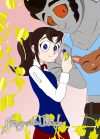
Thank you for reading volume two!
Whew, it's been a wild ride! I never thought I'd get this far in my story. So, again thank you for reading my work so far.
While I'm trying to juggle a lot of heavy themes, Fragmented Blade's central motif is magical girls. Maybe it's just me, but there's a strange correlation between fate and the idea that a normal adolescent girl gets called to fight evil by a mysterious creature. It's usually a cute creature, too. Maybe that's why the girls in the stories are so easily swayed into their agenda. It almost seems manipulative.
But this story isn't meant to parody magical girls. Nor is it a deconstruction. I love magical girl anime! Sure, there are jokes about the tropes, but I wanted to use the genre because of a thematic observation I had while watching shows for research. Fragmented Blade is mainly inspired by Precure, Card Captor Sakura, and of course, Sailor Moon. I wanted the pinnacle of the genre without an ounce of cynicism. It's why I avoided shows like Madoka Magica because I wanted to view magical girls in their most earnest form. Each show had its own formula, but there was a common thread among each show: The girls are reactionary to trouble.
Here is how a typical episode would go: The girl(s) would live their school life, maybe there would be a relationship issue between friends or family, maybe a problem related to school, whatever, but then the villain of the episode would implement a plan (or unleash chaos in the case of the Clow Cards in Cardcaptor), which the girl(s) would stop by the end of the episode. And, what do you know, it would simultaneously resolve the issue in their normal life. How convenient! There are exceptions. Such as when a big event would change the story up, like when the middle-tier villain is defeated, or the girl(s) travel to the evil realm, but for the most part, the girl(s) are not actively fighting the enemy until the enemy comes to them. I found that fascinating.
Why don't the girl(s) try to hunt down the villains until the mid or endpoint of the story? Aren't they active players in their own stories? Or are the villain attacks meant to represent the calamities that tend to interrupt our lives? Sound familiar?
I have no idea if there is any deeper meaning to the magical girl formula, but the idea that the girl(s) are objects within their own story is compelling to me. It didn't change even when the enemy attacked their loved ones. The girls try to live their lives until they are called to fight for justice. But what is their reason for fighting for justice in the first place?
This ties back to the manipulation from the familiars. It's easy to turn this trope on its head and make the familiar have a different or sinister agenda, but I didn't want to do that. It's why I put so much focus on Azrath because I wanted the reader to know that his goals are genuine. He may be misguided, but his cause is noble.
Now that he's out of the way, maybe Noel will find her own reason to fight? But is what she's fighting for actually justice? Look forward to more in volume three!


